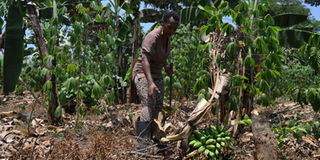Farmers beware of environment

African agricultural research institutions are selective with regard to improving the yields and disease resistance of most traditional food crops and many are quickly disappearing. FILE PHOTO
What you need to know:
- Smallscale farming households in rural villages prefer to buy manufactured fertilisers from shops instead of collecting plant waste and livestock droppings to make composite.
- Our children begin school as infants yet most schools have no gardens where they can demonstrate how biodegradable organic material can be turned into new productive soil.
Africa is our home and we ought to promote its good image. One powerful way to do this should be to promote the wealth of its local foods.
We belong to perhaps the richest continent in the world but its resources are not put to the best use.
Colonialism, western education, and ‘modernisation’ have tended to turn our attention to foreign food crops and food cultures and driven many of us to neglect the production and consumption of our local foods.
Most of the food crops we are struggling and failing to produce sufficiently are not even native to Africa.
Every African ethnic community had its tubers, grains, mushrooms, vegetables, and fruits but we are no longer eating or promoting those traditional food crops.
Where they are still eaten they are no longer cooked or prepared the traditional way. Our so called modern restaurants serve salads, cabbages, carrots, rice, wheat, pizza, chips and sausage etc.
Such restaurants deny the visitors to Africa the opportunity to taste our local foods which actually should be tourist attractions.
African agricultural research institutions are selective with regard to improving the yields and disease resistance of most traditional food crops and many are quickly disappearing.
In my native Buganda young people hardly know about such crops as makobe, kassukussuku, mpindi, mpande mbooge etc. Other ethnic communities in Uganda must also be wondering what happened to many of the traditional food crops that were part of their grandparents’ diet.
We are not even doing enough in terms of maintenance operations to keep our soils naturally fertile.
The farming practices are hostile to our very beautiful natural environment. We are destroying our forests and wetlands.
Smallscale farming households in rural villages prefer to buy manufactured fertilisers from shops instead of collecting plant waste and livestock droppings to make composite.
Our children begin school as infants yet most schools have no gardens where they can demonstrate how biodegradable organic material can be turned into new productive soil.
Very few schools emphasize practical agriculture especially the production of traditional African food crops




